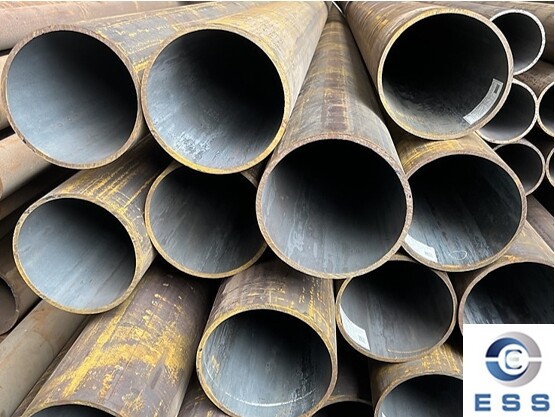
Seamless
pipe is made by perforating a whole round steel. There is no weld on the
surface of the steel pipe, which is called seamless steel pipe.
A106B
seamless pipe belongs to American standard carbon
steel seamless pipe. Its material is carbon, manganese, silicon
steel, and the main chemical composition is as follows:
1. Carbon (C)
The content is generally between 0.29% -
0.36%. Carbon is an important element that affects the strength and hardness of
steel. The appropriate carbon content can ensure that the steel pipe has a
certain strength and toughness.
2. Manganese (Mn)
The content is usually between 0.90% -
1.20%. Manganese can improve the strength and toughness of steel, and also
improve the hot working performance of steel.
3. Silicon (Si)
The content is about 0.15% - 0.30%. Silicon
can increase the strength and hardness of steel, and improve the oxidation
resistance and corrosion resistance of steel.
4. Sulfur (S)
Sulfur is a harmful element. ASTM A106B
requires that the sulfur content does not exceed 0.035%. Sulfur reduces the
toughness and corrosion resistance of steel and also causes cracks in steel
during hot working.
5. Phosphorus (P)
Phosphorus is also a harmful element, and
its content usually does not exceed 0.035%. Phosphorus reduces the toughness of
steel, especially at low temperatures, which can easily cause steel
embrittlement.
A106B seamless pipe has good
comprehensive performance and can meet the use requirements in some harsh
working environments. The following are its main features:
1. Good mechanical properties
Strength
A106B seamless pipe has high strength and
can withstand a certain pressure. In many industrial applications, such as
pipeline systems for conveying fluids (including water, oil, gas, etc.), it can
operate safely within the specified pressure range.
For example, in the city's water supply
pipe network, this steel pipe can withstand the water supply pressure from
the pump station to ensure the normal delivery of water.
Toughness
Its good toughness means that it is not
prone to brittle fracture when subjected to a certain degree of external force
impact. In some environments where vibration or occasional external impact may
exist, such as steam delivery pipelines in industrial plants, A106B seamless
pipes can maintain structural integrity.
2. Superior processing performance
Weldability
The steel pipe has good welding performance
and can be connected by a variety of welding methods (such as manual arc
welding, submerged arc welding, etc.). In pipeline installation projects, good
weldability makes the connection between pipelines firm and reliable, and can
meet the requirements of different engineering layouts and pipeline directions.
For example, in the pipeline laying of
petrochemical enterprises, A106B seamless pipes can be easily welded on site to
build complex pipeline systems.
Processability
It is easy to perform processing operations
such as cutting,
bending, and flaring. This is very beneficial for customizing steel pipes
according to actual engineering needs.
For example, in some special shapes of
pipeline layouts in building structures, such as curved ventilation ducts or
water supply and drainage pipes with special angle requirements, A106B seamless
pipes can meet design requirements through appropriate processing technology.
3. Good corrosion resistance
Under general environmental conditions,
A106B seamless pipes have certain corrosion resistance. For some non-corrosive
media, such as ordinary fresh water, air, etc., it can maintain stable
performance for a long time.
In the ordinary water supply and drainage
system inside the building, this steel pipe can effectively resist the
corrosion of impurities in the water and air on the pipe wall, and extend the
service life of the pipe.
4. High thermal stability
A106B seamless pipe has good thermal
stability within a certain temperature range. In a high temperature
environment, it can maintain a certain strength and structural stability.
For example, in the steam transmission
pipeline system of a thermal power plant, this steel pipe can withstand the
scouring and pressure of high-temperature steam to ensure the safe
transportation of steam; in a low temperature environment, it will not easily
cause embrittlement and other problems. It can be applied to some pipeline
systems that need to operate at lower temperatures, such as some pipelines of
refrigeration equipment.













 Eastern Steel Manufacturing Co.,Ltd not only improve product production and sales services, but also provide additional value-added services. As long as you need, we can complete your specific needs together.
Eastern Steel Manufacturing Co.,Ltd not only improve product production and sales services, but also provide additional value-added services. As long as you need, we can complete your specific needs together.










